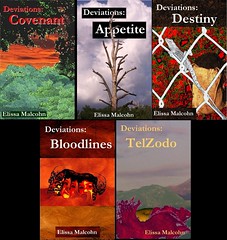Science Poems for January 2011: 5
Last April I posted a science sonnet a day in celebration of National Poetry Month (index with links here). This January I am posting a science poem a day, written in various traditional forms, in honor of Science Online 2011.
The "fifth annual international meeting on Science and the Web" occurs Jan. 13-16, 2011. Click on the logo below to access their daily digest (already active) on paper.li.

As with the sonnets, my January poems take their cues from science-based articles. I also have two works in a special science poem section (vol. 33 #5/6) of Star*Line, journal of the Science Fiction Poetry Association. You can read my "Ciliate Sestina" here.
Today's poem takes its cue from "Jet Lag Uncovered by Mold" (Science Daily, Dec. 29, 2010). Click on the article link to learn more about the research. To learn more about the traditional poetic structure used, click on the form name below the title.
Neurospora Lullaby
(Form: Terza Rima)
For those among the sleep-deprived,
You're not alone, I've heard it told.
The midnight oil that you've survived,
The jet lag making you feel old
Is not unique to humans, for
Among its sufferers -- is mold.
In Norway, at a place called CORE,*
Red bread mold, having gotten rest
Will make conidia (new spores).
But time zone change will leave it stressed.
The fungus gets a tad confused
And then adapts. And in this test
Its inner clock is not amused.
A protein type dissolves away
And leaves its sense of timing bruised.
Some lithium will stretch its day
Because the psychoactive drug
Enables its mRNA
To give circadians a tug,
Extending fungal wakefulness.
The research team has thought to plug
A gene that makes the mold fluoresce
(The same gene found in fireflies),
To tell when mold is at its best.
They wait for it to mesmerize
By lighting up its petri dish,
A welcome sight for tired eyes.
And in their sleepy lab, they wish
To learn how jet lag, fever's broil,
Insomnia as blankets swish
Affect the health of we who toil,
And how we might be set at ease
By creatures we expect to spoil
Our unattended, rancid cheese.
-----------------
* Centre for Organelle Research at the University of Stavanger.
Tonight I'll be on a poetry panel at a meeting of the Tampa Writers Alliance (click here to learn more). "The Heart of Poetic Expression...Learning to Romance Words" will include a discussion of different poetic forms. Says the blurb, "Why is it that many of the best selling novels seem to have a poetic sound to the writing? Perhaps these successful authors have mastered writing poems as well as storytelling. Could understanding the structure of poems help hone the skills of a novelist?"
Elissa Malcohn's Deviations and Other Journeys 
Promote Your Page Too

Vol. 1, Deviations: Covenant (2nd Ed.), Vol. 2, Deviations: Appetite, Vol. 3, Deviations: Destiny, Vol. 4, Deviations: Bloodlines, Vol. 5, Deviations: TelZodo
Free downloads at the Deviations website, Smashwords, and Manybooks.

Proud participant, Operation E-Book Drop (provides free e-books to personnel serving overseas. Logo from the imagination and graphic artistry of K.A. M'Lady & P.M. Dittman); Books For Soldiers (ships books and more to deployed military members of the U.. armed forces); and Shadow Forest Authors (a fellowship of authors and supporters for charity, with a focus on literacy).

This work is licensed under a Creative Commons Attribution-NonCommercial-ShareAlike 2.5 License.
The "fifth annual international meeting on Science and the Web" occurs Jan. 13-16, 2011. Click on the logo below to access their daily digest (already active) on paper.li.

As with the sonnets, my January poems take their cues from science-based articles. I also have two works in a special science poem section (vol. 33 #5/6) of Star*Line, journal of the Science Fiction Poetry Association. You can read my "Ciliate Sestina" here.
Today's poem takes its cue from "Jet Lag Uncovered by Mold" (Science Daily, Dec. 29, 2010). Click on the article link to learn more about the research. To learn more about the traditional poetic structure used, click on the form name below the title.
Neurospora Lullaby
(Form: Terza Rima)
For those among the sleep-deprived,
You're not alone, I've heard it told.
The midnight oil that you've survived,
The jet lag making you feel old
Is not unique to humans, for
Among its sufferers -- is mold.
In Norway, at a place called CORE,*
Red bread mold, having gotten rest
Will make conidia (new spores).
But time zone change will leave it stressed.
The fungus gets a tad confused
And then adapts. And in this test
Its inner clock is not amused.
A protein type dissolves away
And leaves its sense of timing bruised.
Some lithium will stretch its day
Because the psychoactive drug
Enables its mRNA
To give circadians a tug,
Extending fungal wakefulness.
The research team has thought to plug
A gene that makes the mold fluoresce
(The same gene found in fireflies),
To tell when mold is at its best.
They wait for it to mesmerize
By lighting up its petri dish,
A welcome sight for tired eyes.
And in their sleepy lab, they wish
To learn how jet lag, fever's broil,
Insomnia as blankets swish
Affect the health of we who toil,
And how we might be set at ease
By creatures we expect to spoil
Our unattended, rancid cheese.
-----------------
* Centre for Organelle Research at the University of Stavanger.
Tonight I'll be on a poetry panel at a meeting of the Tampa Writers Alliance (click here to learn more). "The Heart of Poetic Expression...Learning to Romance Words" will include a discussion of different poetic forms. Says the blurb, "Why is it that many of the best selling novels seem to have a poetic sound to the writing? Perhaps these successful authors have mastered writing poems as well as storytelling. Could understanding the structure of poems help hone the skills of a novelist?"


Free downloads at the Deviations website, Smashwords, and Manybooks.
Proud participant, Operation E-Book Drop (provides free e-books to personnel serving overseas. Logo from the imagination and graphic artistry of K.A. M'Lady & P.M. Dittman); Books For Soldiers (ships books and more to deployed military members of the U.. armed forces); and Shadow Forest Authors (a fellowship of authors and supporters for charity, with a focus on literacy).











0 Comments:
Post a Comment
<< Home